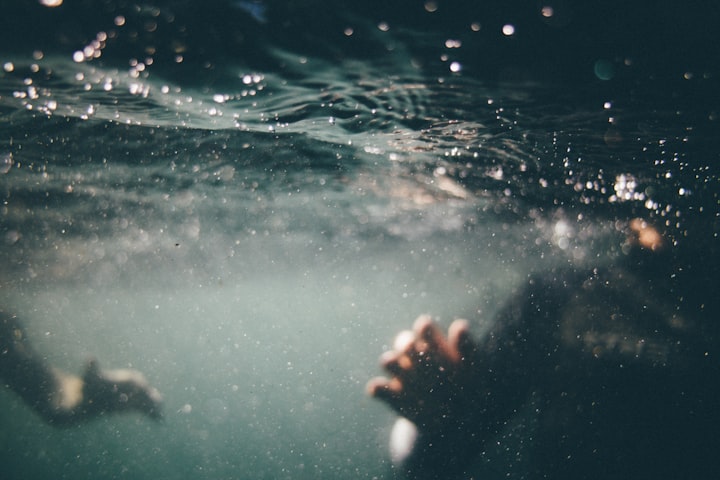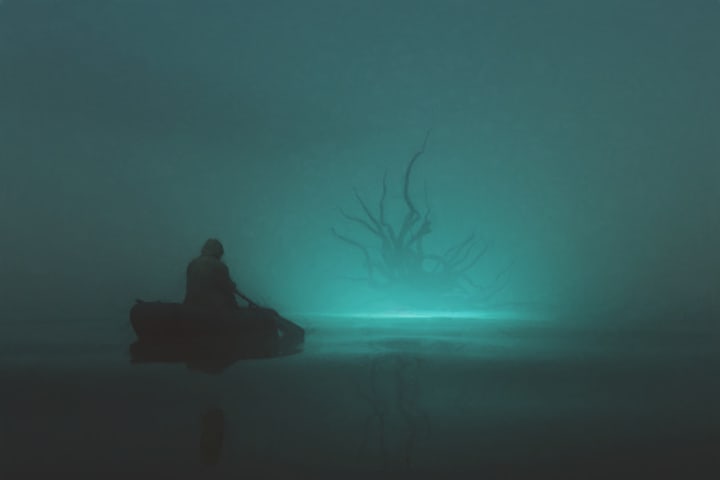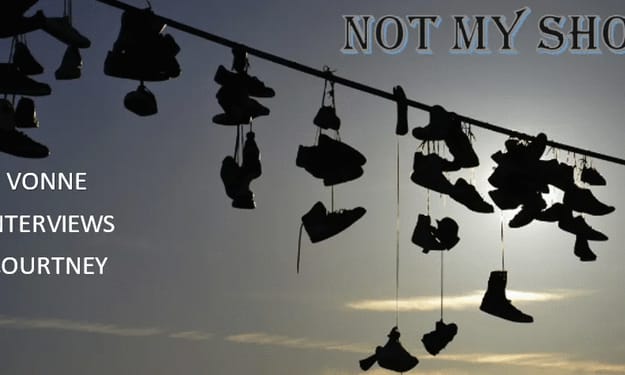The Seal That Was Broken
No Blue = No Green [Story 6]

This is part of a collaboration on how the Plastic Crisis affects our oceans. Each story is unique, a cross of fiction and reality that highlights and brings awareness to a very real problem. I encourage you to read these pieces, think about them, and get involved.
Take a look at the previous story by Courtney Capone, The Struggling Sea Turtle.
They came up from the murky depths before we even noticed. Had they always been here? Or had our greed awoken their hunger?
Looking back, it's clear now. We, as a species, were always doomed to perish from our selfishness. And now, here I am.
Well, here we all are.
What no one expected, or saw coming, was the inevitable tipping point. We thought we would have more time.
Always more time.
It all seemed so inconsequential, but now…now, it makes so much sense. We had all been told repeatedly about plastic straws, microplastics, and recycling. All the time, politicians, scientists, and celebrities talk about species going extinct, water pollution, and on and on.
I did my part with my small blue recycling bin on Tuesday nights and even bought a reusable straw for my morning Starbucks. Everyone knew about that horrific lump of floating waste in the Pacific, called the Pacific Garbage Patch— but I wasn't responsible for it.
I did my part, after all.
I had lived my entire life on the island of Hawai’i and was working as Resort Manager at a large resort when the first domino fell.
It started with a curious buildup of fish on the ocean's surface. Not dead fish, like we had seen before. These were live fish, seemingly flocking to the surface of our once clear water and sandy shores. It wasn't long before biologists and scientists swooped in like hungry gulls with their beakers and theories. Some were logical, while others allowed their ideas to devolve into wild conspiracies.
News anchors would regurgitate the rumors daily until finally, a piece of news caught my ear.
It was the news of the disappearance of the local Monk Seals. Here on the island, the Hawaiian Monk Seal was unique to our ecosystem—and it played a vital role in the fish, squid, and crustacean population. They were critically endangered here on the island, with only about 1100 left, primarily due to humans and their ignorance or greed. To us, the natives of this land, Ilio-holo-i-ka-uaua, or 'dog running through rough seas', was more than just a seal; it was part of our culture.
The scientists on the television explained the intricacies of the Monk Seals vanishing so suddenly. Strange to say the least, especially considering that they were protected and tucked away from the prying eyes and hands of humans. There was, of course, contact with humans occasionally, with any contact being seen as unfavorable. But apparently, it was their contact with plastics, fishing gear, predation, and loss of habitat was the biggest threat to their species. Of course, intentional killing was a potential explanation for their disappearance.

But all of them, at once?
Many tourists in the past had asked about the seals, and I would tell them of the times I had traveled and seen them from a distance. It was always wondrous to watch their faces light up at the thought of seeing such a rare creature.
I shudder now when I think of the times I had relayed those stories to other faces. Men whose eager and covetous eyes widened at my tale in a wicked way, one that made me nervous and uncomfortable. I had seen their smiles, crooked and cunning, as they would set off onto the ocean. I turned my head at the time, unwilling to accept what the stains they dragged into the hotel lobby told me.
Humans were the genuine predators of our oceans.
Could the disappearance of this one seemingly unimportant animal be the missing link? Was this what was causing this apparent collapse and overpopulation? Scientists and biologists were stumped as to why other species weren't taking advantage of the sushi buffet on our shores.
That's when the second domino fell. Or rather, when we realized it had already fallen.
The tiger sharks and larger marine predators began to wash ashore two days later. They were mauled and bloodied yet uneaten by whatever had dismembered them. This apparent massacre of such fierce predators shook our towns and small villages to their core. Rumors swirled that the sea was extracting its wrath upon man, the possibility that something older was coming, and these signs were breadcrumbs that it was coming to take its offering from the surface.
I was concerned about everything besides seals and folklore to listen. I was too involved with potential revenue loss, tourism, and the traffic caused by the new influx of government suits everywhere.
I barely noticed when the elders of my town soon moved inland or to the mainland. It all seemed to happen so quickly, and it was only a matter of days before the incident occurred.
The third domino finally fell. And when it did, it was loud and chaotic.
The day had been beautiful and was now fading into dusk. Oranges and pinks streamed in through the fully windowed lobby, and a light wind poured off the ocean. The smell of salt and fish wafted through the hotel's automatic doors, mixing with the aroma of coffee and soft pop music. It had been a typically tourist-ridden day, and I was doing my best to hold it all together—complaining guests, late employees, and— that’s when it happened.
The sound was unearthly and reverberated through the lobby. I watched as others covered their ears, faces contorted in panic. It was a mixture of an alarm, melted into some sort of earsplitting screech.
At first, I thought it was a fluke, some kind of alarm from the hotel or city. The pitch caused my heart to rattle against my ribcage and made my skin instantly feverish. I looked toward the doors, now closed and eerily still. Everything moved slowly, and an unusual high-pitched buzzing ripped through the previous lower sound. Fluorescent lighting flickered and promptly exploded into thousands of pieces, leaving us with only the light from the fading sunset.
Patrons in the lobby were screaming; I could see that. But everything sounded muffled, as if I was submerged below a wave. Blood flowed against the marble floor as shards of glass exposed muscle and bone while everyone continued to flail around the lobby in terror.
Was I bleeding? I couldn’t tell at the time, but I prayed my blazer had protected me from what I figured was an earthquake or impending eruption of sorts. The shrieks continued, feeling so distant to me, covered by the sudden influx of heat flowing through the room.
I looked outside in a feeble attempt to see where the sounds were coming from. Was this a tsunami? Some act of terror?
Beyond the glass doors was the ocean, but not as I remembered it. The once crystal blue water had been replaced with a murky merlot, with large curling tendrils of inky blackness dancing above the cresting waves. Like some sort of octopi, the tendrils seemed to be swaying back and forth, whipping and feeling the air above the surface of its watery home.
What… what the hell was that?

The sight made the sides of my vision blur, and the sound of screaming static hissed in my ear like a cornered predator. That was all I could manage before I was forced to turn away and retch my Starbucks and dinner up. The walls shook, and the crashing down of décor was released onto the floor, and I watched helplessly as my hotel patrons were caught underneath their weight.
I squeezed my eyes shut and kept my ears covered as the sound persisted. My hands were now moist, with warm liquid oozing through my fingers. The scent of iron had invaded my nostrils as a crushing pain enveloped me. My lungs tightened, my head throbbed, and I felt as though my body was trapped against an invisible net of sorts. Moving was no longer an option, and I felt myself crumbling to the ground.
I was in such a state, I never even felt when Asualu had pulled me up from the ground and carried me out of the devastation.
***
I woke up later, in a dimly lit room. The screeching sound had gone, but my head felt clogged and groggy. I could see Asualu, my recreations manager, on another bed with his back to me. I realized we were in a hotel room, with other people lying on the couches and floor. I sat up, groaning as pain radiated through my head.
“Hey, hey,” Asualu turned and rushed to my side, “calm down, okay? It’s okay now.”
But it wasn’t okay now. I could tell he was lying by the fear etched on his features.
We would learn together how the world had shifted since the mysterious incident. We would listen on the small radio that it was not an isolated event, and we were not the only ones left alive. Around the world, anyone near the ocean was struck by the strange earsplitting sound that seemed to paralyze them, followed by some sort of entanglement. Those caught would struggle but could not release themselves from whatever invisible web had trapped them. Those who had been caught on or near the shores had all been lost to the sea. Now, humankind was huddled together inland, hiding from the tides and sandy beaches we once ruled.
Far beyond the shores of Hawai’i, those tentacled beings from the deep had somehow orchestrated an oceanic culling. Something had indeed come to take their offerings from us and would continue to do so. The radio offered information; perhaps it was some amalgamation of toxins in the water and octopi. Maybe it was a mutated siphonophore. Or perhaps the collapse of marine ecosystems had allowed for rapid evolution.
But I have a different idea.
I believe those things have always been there, waiting. Feeding off our toxins, watching us poach and pollute their oceans while their rage built in the depths. Finally, they struck at us as we have been for millennia. After all, scientists can’t explain the terrifying hook marks seen in the mouths of those caught near the shore before they're lost to the sea forever.
Look out for the next story in this series, from Colt Henderson. A tale of a young woman who learns the dangers of single use plastics and their effects on the ocean.
In the meantime, if you’d like to learn more about what you can do to help the Hawaiian Monk Seal and other animals in danger, check out:
About the Creator
Vonne Vantablack
An unreliable narrator with a knack for telling tall tales.
IG @vonnevantablack
“In sterquiliniis invenitur”






Comments
There are no comments for this story
Be the first to respond and start the conversation.